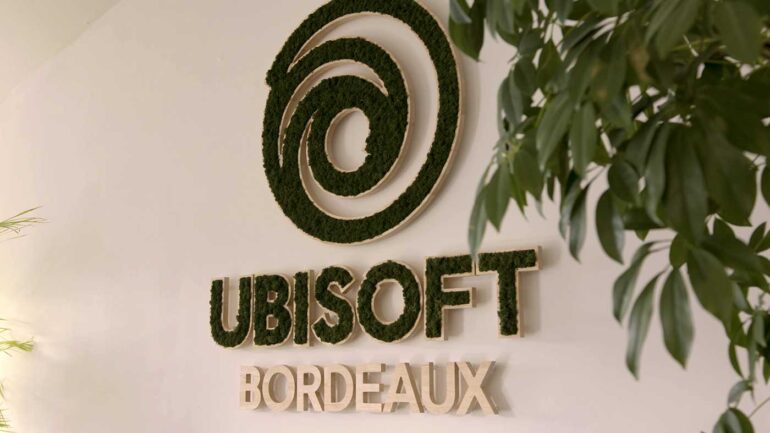“Cautious”
I’m sitting in a room decorated with an assortment of Ubisoft IP marketing offcuts. Lifesize Rabbids stare me down as Bordeaux, France crosses over into early evening and my body clock is screaming. Across from me sits the Art Director on Assassin’s Creed Mirage, Jean-Luc Sala, a man with an easy gait and an even easier laugh. I’ve just played through several hours of the game under the watchful eye of the team at Ubisoft Bordeaux, the first time they’ve seen third-parties touch the fruits of their labour, and while there will be plenty of time to talk about the return to stealth for the long-running franchise, for now all I want to do is ask Sala about how it felt to be tasked with recreating a place as storied, and misrepresented, as Baghdad. “Cautious” he says with that same light gait but a slightly less easy laugh, “…it’s my first Assassin’s game, so I was really cautious also to not be the one who messed everything up.”
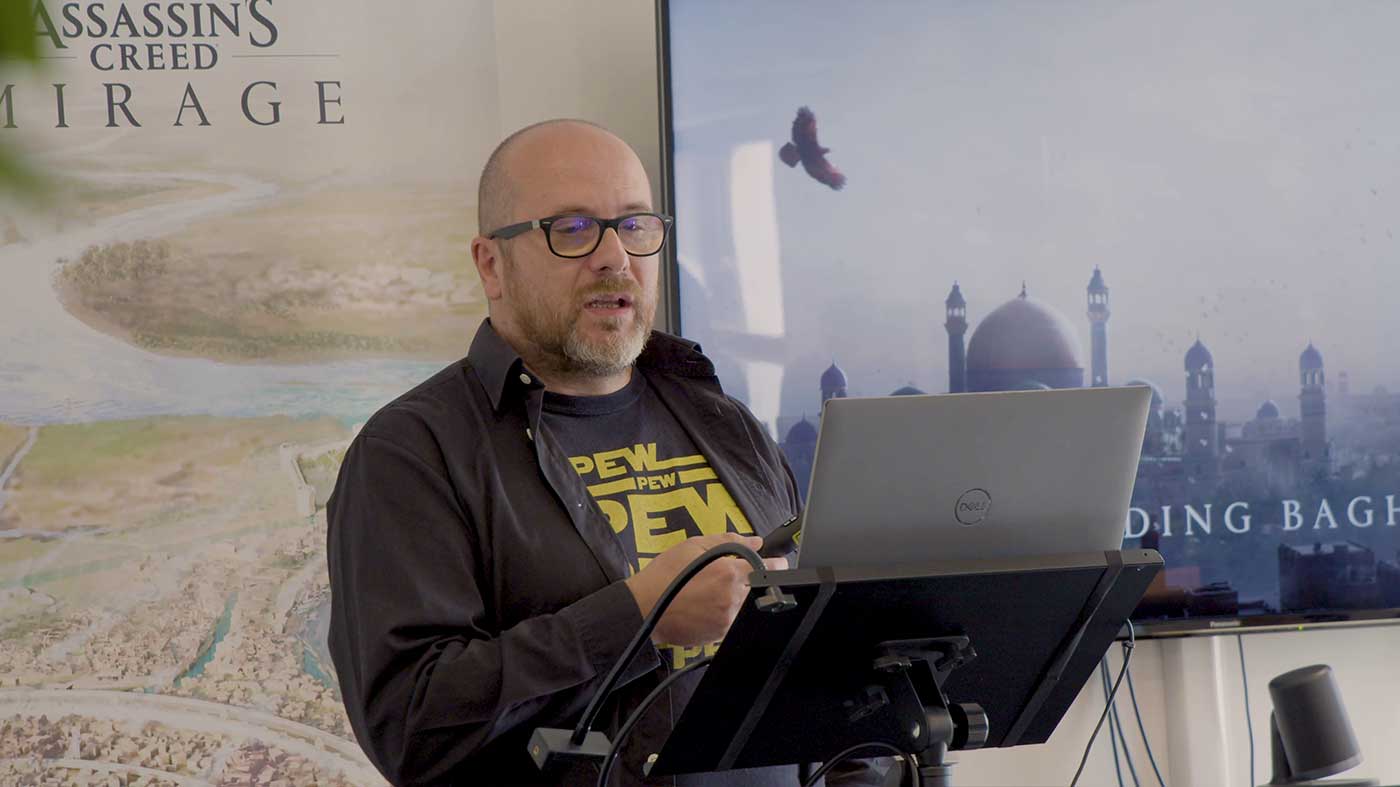
Assassin’s Creed has come to mean a lot of things to a lot of people. The now sixteen-year-old franchise has run the gamut – over half a dozen studios, billions in revenue, genre-hopping in search of a new identity, multi-media spin-offs, countless platforms, and ports. It doesn’t really end, Ubisoft having spent the better part of the decade defining the AAA game space, but it was the unassuming 2007 stealth title about memory DNA and an ancient order that would birth one of the industries largest franchises. And while growth, and inevitable change, precipitated the series’ mammoth success, fans of that original, humble beginning remained.
Many of them, it turns out, got jobs at Ubisoft Bordeaux. A relatively small and fresh-faced studio based in the scenic port-city best known for its wine, this is a team largely comprised of developers who cut their gaming teeth on the first entries in the Assassin’s Creed franchise, the average age of the team here being early thirties. When it comes to what makes this franchise special to the person reading this with fond memories of Ezio Auditore’s antics on the Xbox 360 and the bulk of developers working on Mirage right now, the common ground is happily shared. Walking through their current office space (the team is preparing for a move to a larger, far nicer office according to the concept art on the walls in the break room), it’s hard to not get the impression that Ubisoft Bordeaux has been allowed to pull off a heist with everyone watching.
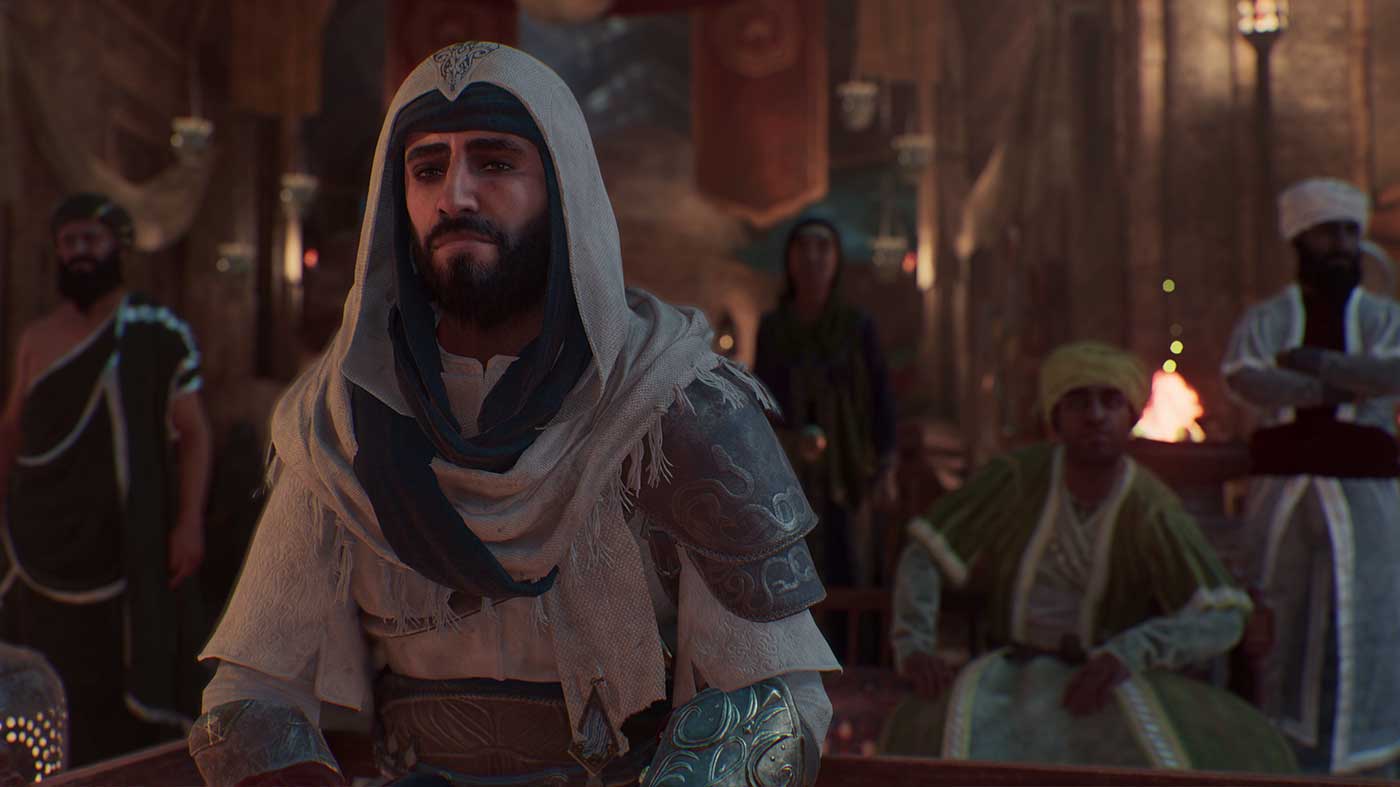
“I think for us, and for me, it feels very natural because we were part of, I would say, the people who were eager to play an Assassin, going back to the roots, being able to parkour through a city, doing stealth assassinations and stuff like that,” Fabian Salomon, Lead Producer on Mirage tells me in the Just Dance room. “Even if honestly, I really enjoy playing the most recent games, like Valhalla, Origins, and Odyssey is a blast. So, I’m a bit mixed… It’s good to keep on proposing both kinds of experience at some point because it’s really enjoyable and I think it’s really important to keep on exploring new settings too.”
Listening to Salomon talk about the process behind Mirage is fascinating. Ubisoft Bordeaux aren’t exactly green when it comes to the franchise, the team having worked on the Wrath of the Druids DLC for Valhalla, itself something of a fan-favourite story. But as the finishing line for Mirage comes into sight at last, Salomon reflects on how it’s been to lead a full Assassin’s Creed title for the first time. “How does it feel today? It’s a relief because we really are very close to shipping the game. It was a fantastic adventure, intense and challenging. It was, for myself, a lot of pressure because it’s Assassin’s Creed, it’s myth, even for most of us. I grew up with this franchise, obviously, so I feel very honoured to have been able to work on this project. And so, I try to stay humble, obviously, but I feel very lucky.”
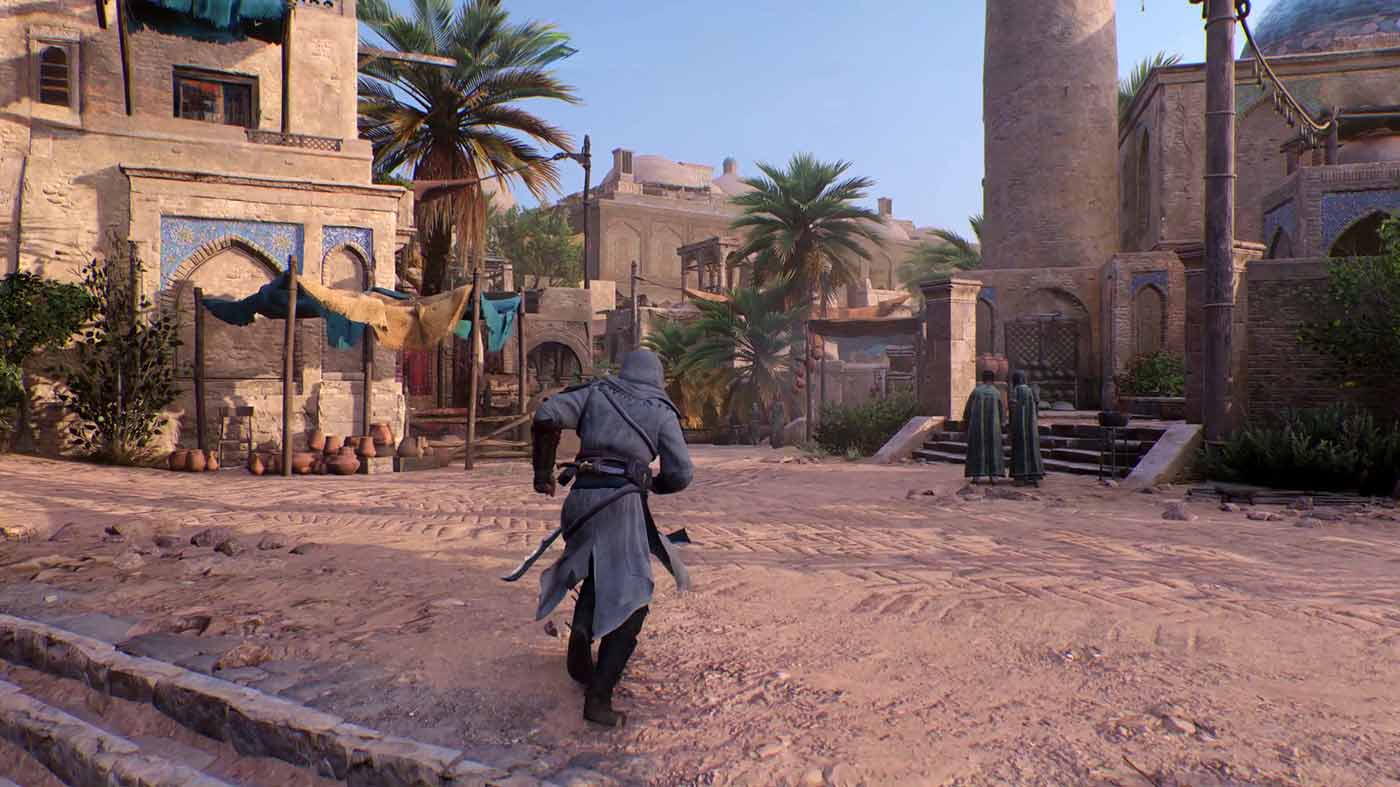
All things considered, it’s maybe not that surprising that Ubisoft decided to take another shot at the more traditional ideals of the franchise. A growing trend in fandom spaces has been the idea that vocal demand for a product to be a certain way is the best indicator of direction for a corporate body to take when it comes to future products. This is, to my mind, a fraught path that often blurs lines between consumers and artists, rarely ever benefiting either in the long term. But in the case of Mirage, the call initially seems to have come from inside the house. Planned as another DLC for Valhalla, Mirage, as these things are wont to do, warped and shifted under closer inspection and the team’s passion for the project had it taking on another form entirely. I asked Salomon about the makeup of the team and how it has impacted the direction of Mirage as a project.
“We have people that worked on the first Assassin’s Creed as developers. That’s why the average age is… I would say old people,” here he breaks into a laugh, our collision of languages allowing neither of us to help the other as we fumble for the right words, but he continues, “But we are veterans, programmers, and developers that used to even work on older games here in Bordeaux. And I guess even for the new ones or the youngest people, we have a lot of fans of even the games of the first eras. So, they really wanted to put their own pieces in this game to kind of honour the franchise.” Institutional game development knowledge is often the first thing under threat in the shifting sands of the modern AAA market and to see Salomon light up as he talks about the almost generational collaboration happening on Mirage in his office is warming.
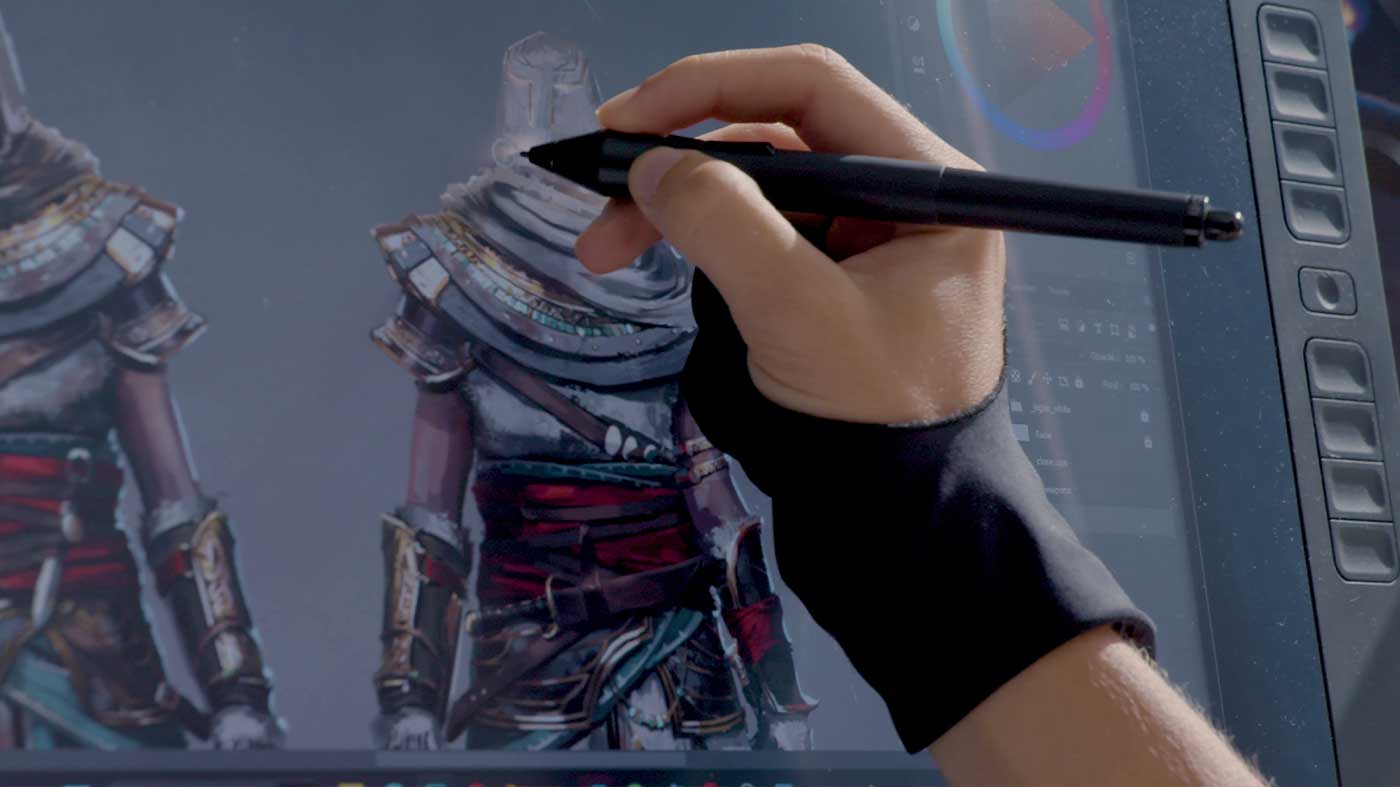
Which isn’t to say that Ubisoft Bordeaux has been going it alone. The majority of mainline Assassin’s Creed titles have been huge, collaborative efforts between Ubisoft’s many studios and Mirage, while personally driven, is no different. “It was a critical support, to be honest. As you know, we are a pretty young studio, even if we have a lot of veterans. But doing a game like Mirage, even if the scale is shorter and smaller than any other big Assassin’s Creed game, it’s really complex,” Salomon explains.
“Without our dear partners, this project would not have been real. I have in mind (Ubisoft) Sofia, Singapore, Kyiv, Odesa… I’ve missed obviously a lot of others, but they were very critical on this project. And to us, it was really important to find a way to give them a high amount of ownership, like, okay, what do you want to do? We know your expertise on this, what can you propose? So that’s why, for instance, with Singapore, we restarted the collaboration with them very early in the process and we really proposed to them, you are very good at doing world design, quest design, etc, so what about you will be able in charge of many districts and potentially a lot of main arcs from the quest? It was a risk and a challenge, but we felt like they were the perfect one. And I’m very convinced that giving ownership to developers, you will have the best from them. So that’s the way we try to achieve that.”
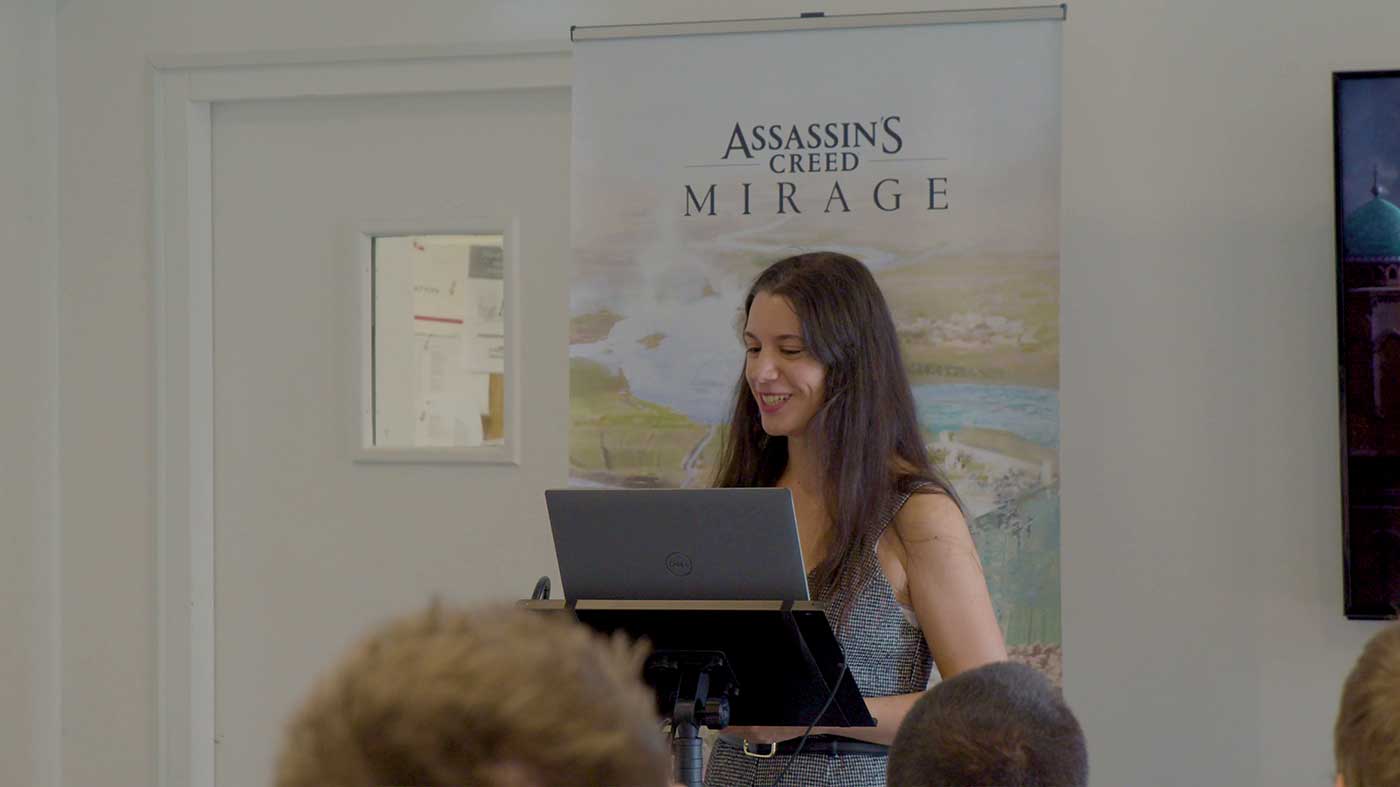
Salomon’s faith in his team is exemplified best inside the Bordeaux studio though, where Sala and the team have spent years labouring over something the Assassin’s Creed series does as second nature – historical recreations. “It was not the easiest setting, I should say. We had a lot of red lights,” Sala explains when I asked about the importance of getting an unrepresented culture right, “Just like, we are going to talk about religion, we are going to talk about a culture that is not easily found in entertainment media, or when it is, it’s not really the way they would like to be represented. And so, we knew we had to be cautious and to do everything to do it right. Just like every Assassin’s Creed is tackling a culture, a setting…and I felt at the very beginning when we announced the game in September, but even before, because we made all that work to make it happen, to say, ‘this is going to be the Arabic Assassin’s Creed’ and to be sure that the Arabic world will be happy to have it.”
While the unveiling of the game was met with a positive reception, behind the scenes at Bordeaux the team was neck deep in what would turn into one of Ubisoft’s most challenging Assassin’s Creed titles to date. Baghdad is a historically difficult city to catalogue, centuries of war and the corrosive sands of time leaving us with a very loose understanding of how the once thriving multi-cultural hub actually stood in its prime.
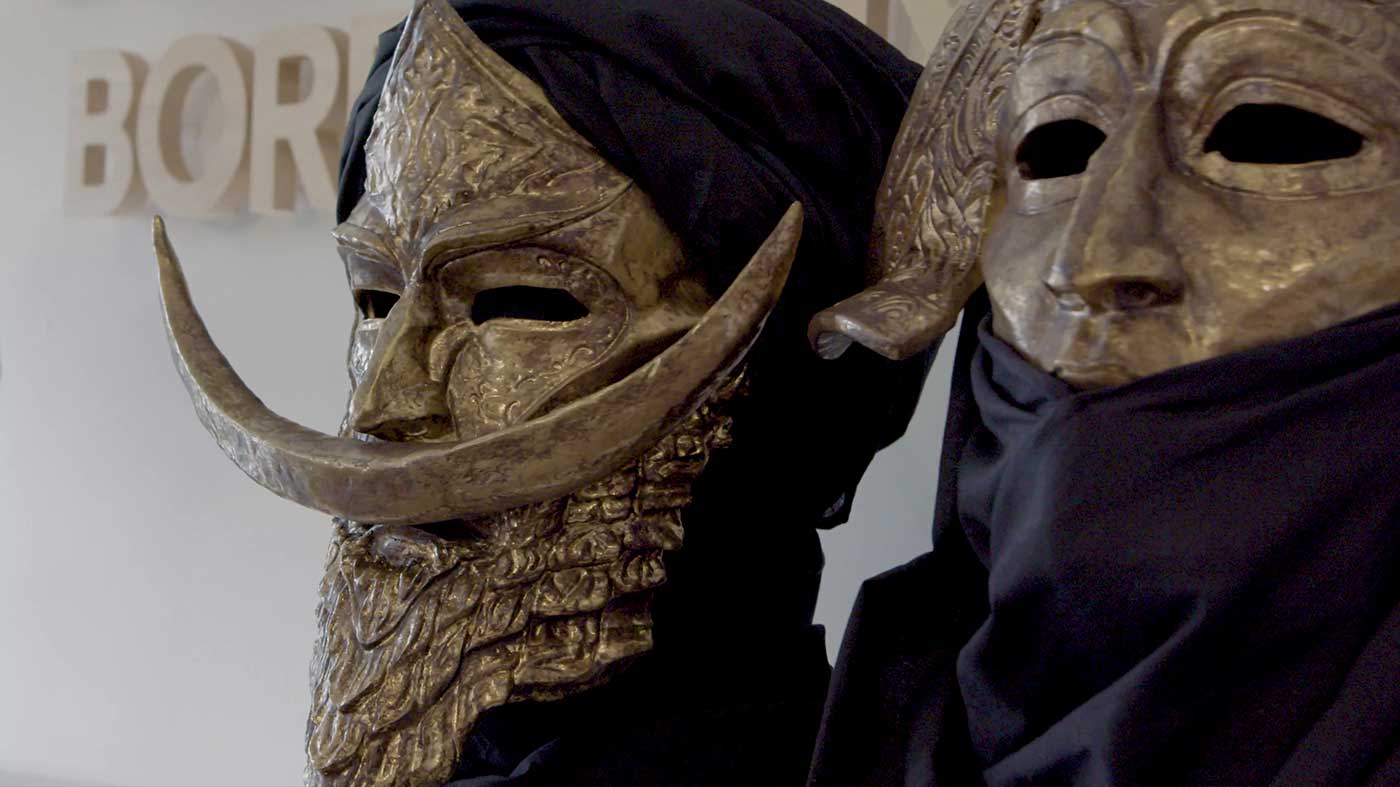
This is not lost on Sala and the team, “There was an interesting article when we said we were going to Baghdad, a professor of archaeology or history wrote an article saying, ‘Ubisoft is going to explore Baghdad and the Abbasid period – good luck to them’,” Sala laughs, again easily but not without a hint of exhaustion. The article went on to explain that the nature of exploring this era meant that historical reference points would be much harder to find for the team. “So that’s when we started with just what was the architecture like, what are the texts, the historical text at that time, what they were talking about… so, it’s a reconstruction. Very difficult because of the assets but also very soon we discovered it was a freedom of creativity.”
This freedom rippled through the game’s artists and level designers the most, Bordeaux consulting with an array of historians to get a better understanding of the tools they would need to build to faithfully recreate such a richly storied city. During a presentation on the process of constructing an ideal Baghdad, the studio walked us through an array of culturally significant cornerstones of the city and surrounding area. Distinct districts mark the layout of the map, from the busy markets of Karkh to the dreary and often overlooked worker district of Harbiyah. The Four Gates of Baghdad were also a point of pride for the team; these colossal barriers to the inner-city were designed to best reflect their adjacent districts and cultures, history itself having conflicting reports on their actual appearance allowing the team to consult and craft a particular vision of this golden age.
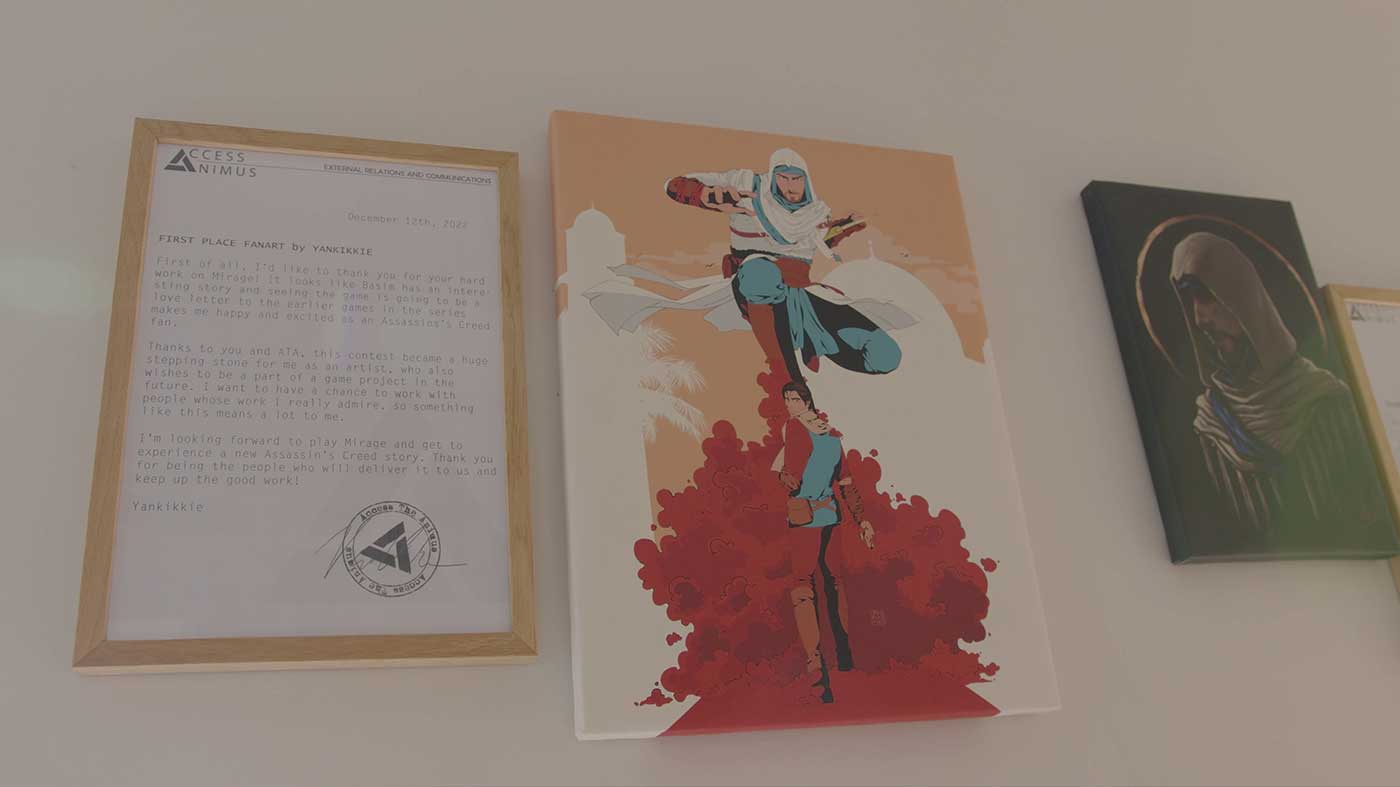
“It took a long time,” Sala says, leaning back in his chair to cast an eye over the artists working just outside of the IP room. At one point during the interview, he excitedly tells me about how hard they had all been working on this project, shooting a little wave through the glass door to puzzled but smiling faces. “You start with a tool kit, an architectural kit. After that you do the landmark kit. So, it was really asset by asset and thematics after thematics. And at the same time when we prepare the kind of Lego box we need to do the kits, we were also mapping the cities urbanistic level and deciding to perhaps not do that, but if we don’t do that, we can have that instead. And that’s when we started to talk about Alamut. The level artists were responsible of making the streets per streets, the city and shops per shops, everything, even the flowers and the vases. They did it themselves, decided it was going to be there. So, from macro to micro, it has been a long time.”
It’s not lost on me as an Australian writer visiting a studio in France that I’m in no position to offer any clarity on the validity of Bordaeux’s work surrounding Baghdad and its intersection of cultures and religions. The office is practically littered with books about the city, stacked between Funko Pops and assorted Assassin’s Creed collector’s editions, nobody we had the chance to spend time with didn’t at some point acknowledge the weight of this attempted cultural recreation. Sala, who’s childhood in the Persian Gulf was disrupted in 1979, causing his family to flee through Baghdad and forging a lifelong connection to the region, reflected on the need to be as respectful as possible when dealing with this kind of game, “We had a team helping us to be respectful in every aspect because of course we studied a lot of Middle East culture but you’re going to have monasteries with Nestorians, so it means Greek Orthodox, Greek religious people, and we have some Chinese characters and so on. So yes, it was made with the same attention but with different experts.”
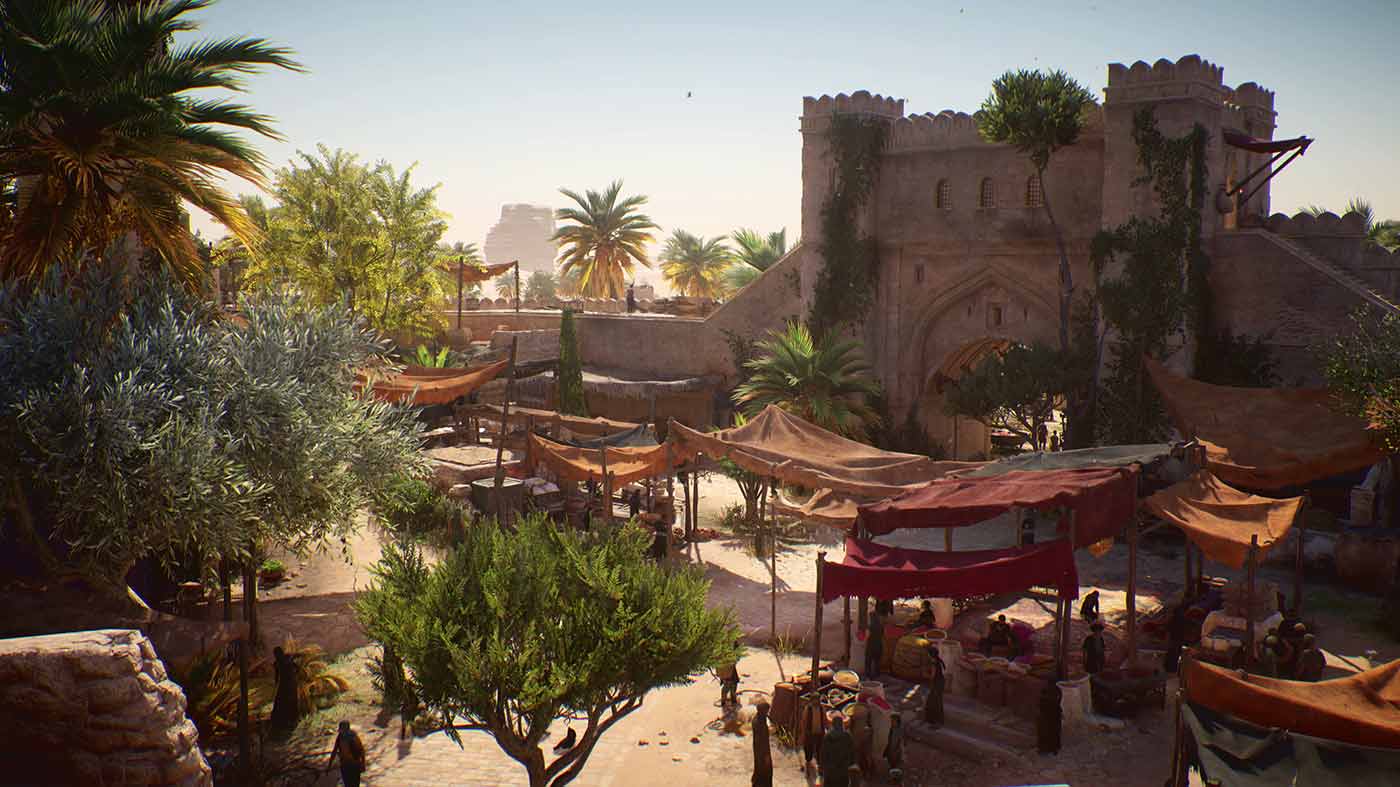
Sala seems to fully embody the spirit of Ubisoft Bordaeux and the studio’s approach to creating Mirage. Light on his feet, quick to laugh, but never not ready to unpack the how and why of making such a game. As we wrapped up our time together, we shared memories of previous Assassin’s Creed titles title and how far Mirage had come, even if just in its visual representation of the Middle East. “When they told me, ‘what do you want to have?’ I said, I want pink flamingos, I want marshlands, I want palm tree groves and the canals, because I remember the place as being very greenish and it’s really the opposite of the cliché,” Sala explains, “So that was when I started to say, let’s be grounded. Stop using filters every time. And it’s going to be perhaps… the same colour everywhere, but you will have the feeling of being there. People from the culture, they noted that it was really looking like the real stuff.”
Assassin’s Creed Mirage launches on October 5th, 2023 for PS5, PS4, Xbox Series X|S, Xbox One and PC. Amazon has physical pre-orders for $64 including shipping.
The author travelled to Bordeaux as a guest of Ubisoft for the purposes of this interview content.


